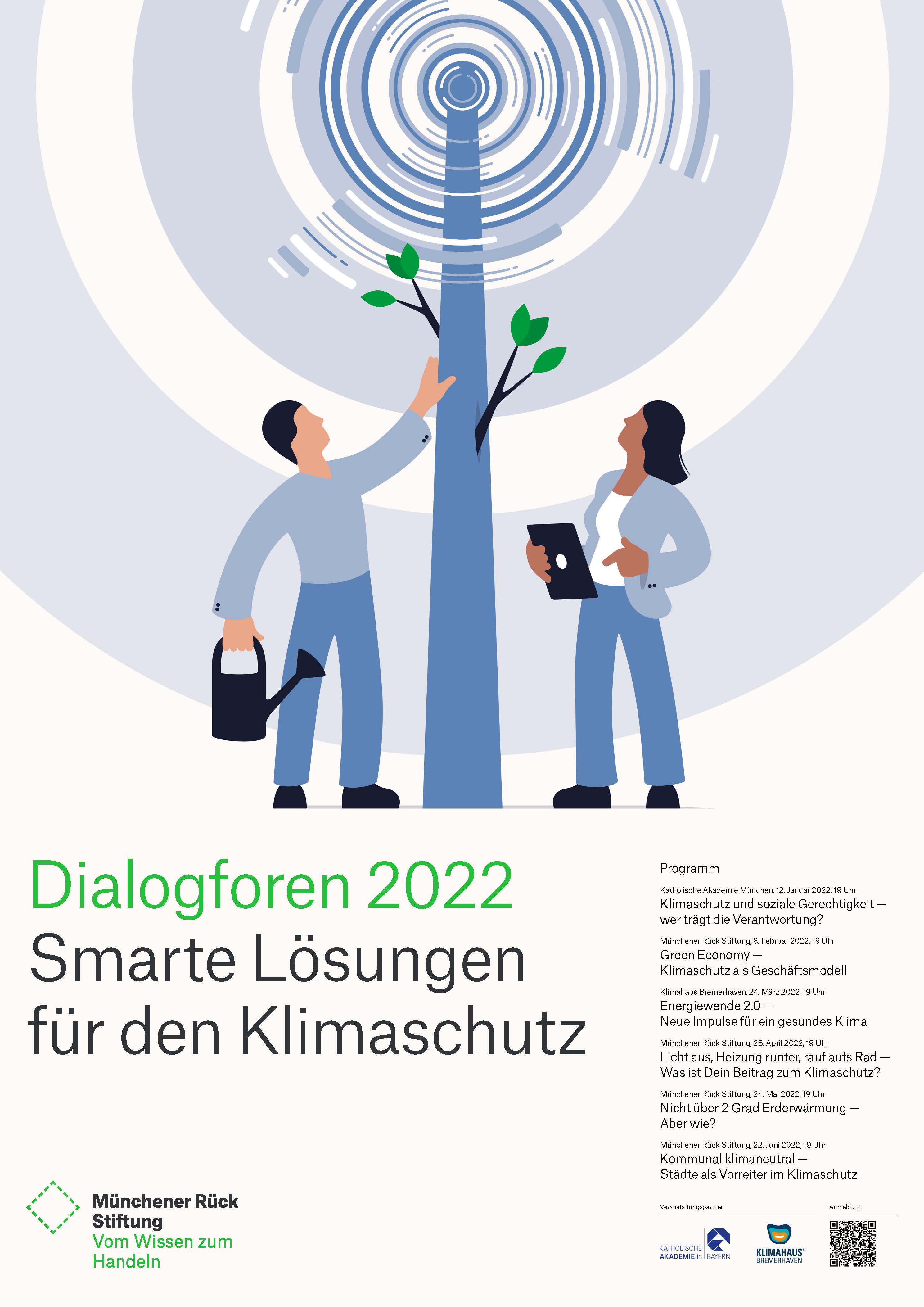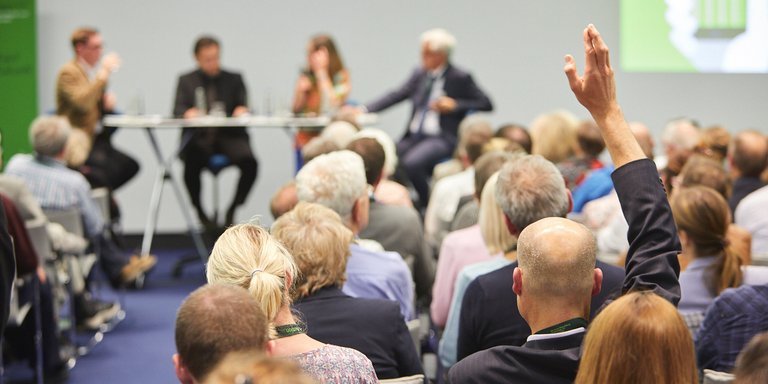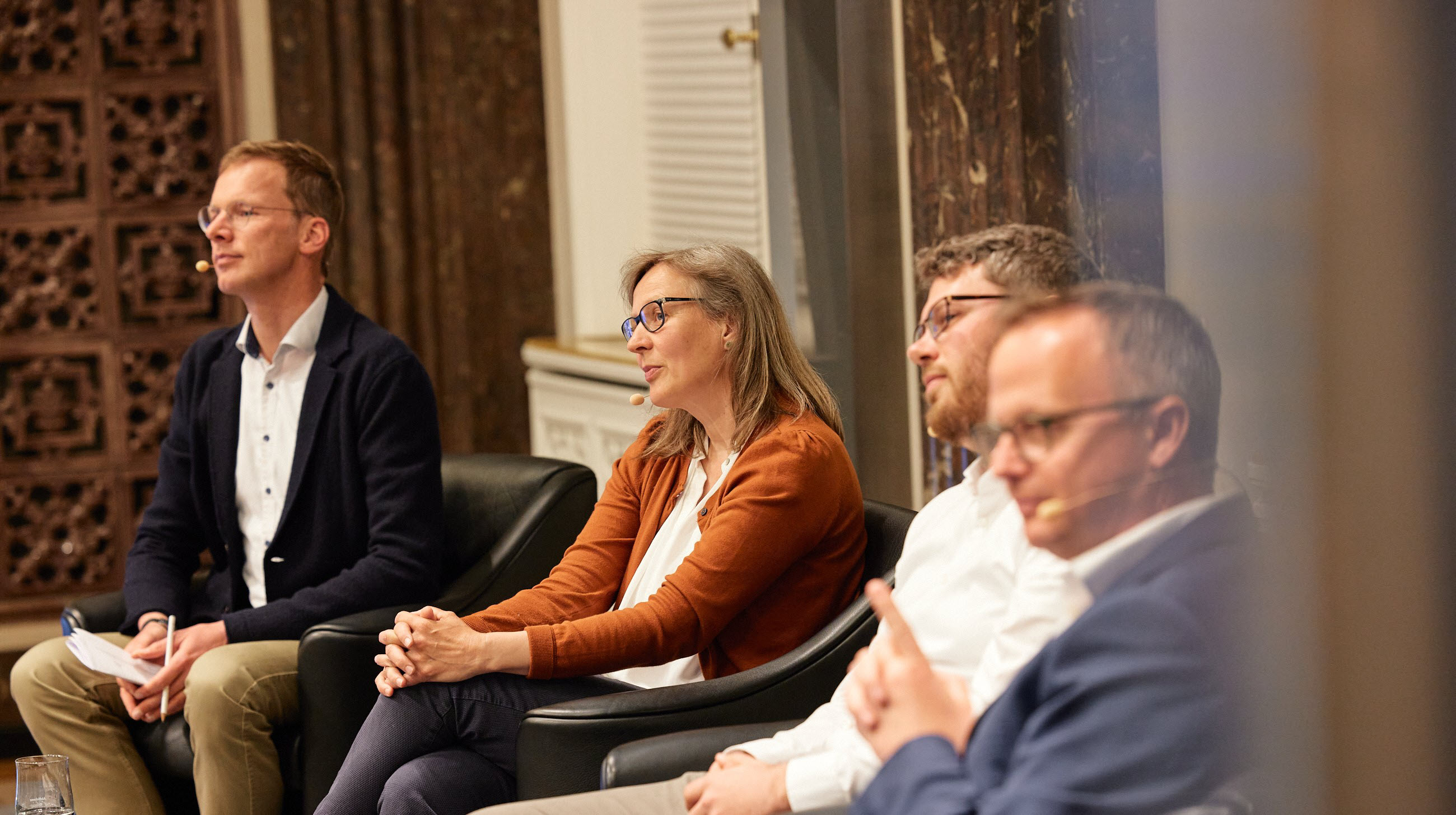
Smart solutions for climate protection
Dialogue Forums 2022
properties.trackTitle
properties.trackSubtitle
In April 2021, the Federal Constitutional Court confirmed what many research institutions, organisations and civil observers had long suspected: that the 2030 German climate targets are not clearly enough formulated . Urgently needed emission reductions were being pushed too far into the future, and the measures after 2031 were not specific enough. We all have to become more ambitious and see climate protection not only as a threat, but also as an opportunity. In the 2022 Dialogue Forums, we will examine these issues together in more detail, find out which players are particularly important and, above all, what solutions are already available today.
Reports
Dates, times and venues
All Dialogue Forums 2022 will start at 7 pm and are scheduled for approximately 2 hours. You can find the exact dates in the agenda below and on the websites for the respective evenings.
For the Dialogue Forums 2022 we were able to win two very renowned project partners: The Catholic Academy of Bavaria and the Klimahaus Bremerhaven.
Programme at a glance
Catholic Academy Munich, 12 January 2022, 19:00 (Online)
There is no alternative to climate protection. But who plays which role and who is responsible for taking action? How can we design measures in such a way that the burdens are distributed intergenerationally, internationally, and socially justly? Is the EU creating a common climate policy responsibility with its European Green Deal? And how do we overcome the regulatory patchwork and create a new governance framework as well as new incentives for climate protection?
Panellists:
Prof. Dr. Ottmar Edenhofer, Director and Chief Economist of the Potsdam Institute for Climate Impact Research and Director, Mercator Research Institute on Global Commons and Climate Change (MCC), Berlin
Prof. Dr. Remo Klinger, Honorary Professor, University for Sustainable Development Eberswalde
Hildegard Müller, President, German Association of the Automotive Industry e.V. (VDA), Berlin
Moderation:
Prof. Dr. Johannes Wallacher, President, Munich School of Philosophy
Partners
Munich Re Foundation, 8 February 2022, 19:00 (Online)
Climate protection has typically been seen by the private sector as a risk factor for economic success, with the impending costs being the only relevant factor. However, a rethink has been underway for some years now. Climate protection can indeed serve as a driver of innovation and offers profit perspectives in many sectors. Today, preventing climate change is no longer just an issue for small greentech start-ups, but involves the transformation of the entire business world. What business opportunities does climate protection offer? How can climate protection be used as a growth engine?
Panellists:
Wolfram Günther, Minister for Energy, Climate Protection, Environment and Agriculture of the State of Saxony, Dresden
Sabine Nallinger, Executive Director, Foundation 2°, Berlin
Dr. Adriana Neligan, Senior Economist for Green Economy and Resources, German Economic Institute (IW), Cologne
Ralf Pfitzner, Head of Group Sustainability, Volkswagen AG, Wolfsburg
Moderation:
Caspar Busse, Senior Editor, Süddeutsche Zeitung (SZ), Munich
Klimahaus Bremerhaven, 24 March 2022, 19:00 (Online)
The Renewable Energy Sources Act (EEG) initially gave the climate turnaround a great deal of momentum and has been exported to other countries as a successful model. But this momentum has recently begun dissipating. We particularly need to catch up in the areas of transport and heating. We need a version 2.0 of the EEG – how might one look? Do we not have to think more holistically in order to achieve our climate protection goals? What new technical possibilities are available to us, and what can realistically be implemented? What role might the hydrogen economy take on, for instance?
Panellists:
Prof. Dr. Claudia Kemfert, Head of the Energy, Transport and Environment Department, German Institute for Economic Research (DIW), Berlin
Andreas Kuhlmann, Chief executive, German Energy Agency (dena), Berlin
Dr. Ingrid Nestle, Member of the German Parliament, Head of the Working Group and Spokesperson for Climate Protection and Energy, Bündnis 90/Die Grünen, Berlin
Dr. Sopna Sury, Chief Operating Officer Hydrogen, RWE Generation SE, Essen
Moderation:
Christopher Schrader, Science journalist, Hamburg
Partners
Munich Re Foundation, 26 April 2022, 19:00 (Online and in-person)
It has long been clear that the fight against climate change can no longer be won by politics alone. International processes, particularly those surrounding the Paris climate agreement, appear too sluggish at present. Other actors, such as the private sector and individuals, must increasingly contribute if we still want to achieve the 1.5 degree target. What can people actually do? How can we best decarbonise our lives?
Planned panellists:
Julian Bischof, Researcher, Institute for Housing and the Environment (IWU), Darmstadt
Heike Holdinghausen, Editor for Economy and Environment, taz, Berlin
Kai Horn, Head of Sales and Marketing, Mobility platform highQ, Freiburg
Prof. Dr. Meike Jipp, Head of the Institute, German Aerospace Center (DLR) Institute of Transport Research, Berlin
Moderation:
Andreas Unger, Journalist and moderator, Munich
Munich Re Foundation, 24 May 2022, 19:00 (Online and in-person)
The goal of not overheating our Earth by more than 1.5 to 2 degrees is ambitious, and at the same time necessary. However, models show that CO2 emissions are sinking too slowly. Even if we significantly increase our efforts, unavoidable loads remain that have to be compensated. Does this mean that we have to remove CO2 from the atmosphere? And if so, how? And where would we put it? Many natural and technical methods have been scientifically discussed, and some of them are already being implemented. What quantities are we talking about? What is technically feasible? And socially and politically acceptable?
Planned panellists:
Prof. Dr. Anita Engels, Professor of Sociology, University of Hamburg
Prof. Dr. Dirk Messner, President of the Federal Environment Agency (UBA), Dessau-Roßlau
Prof. Dr. Andreas Oschlies, Professor for Marine Biogeochemistry, GEOMAR Helmholtz Centre for Ocean Research, Kiel
Dr. Nina Scheer, Member of the German Bundestag, Spokesperson for Climate Protection and Energy Policy of the SPD Parliamentary Group, Berlin
Moderation:
Dr. Marlene Weiß, Head of Science Section, Süddeutsche Zeitung (SZ), Munich
Munich Re Foundation, 22 June 2022, 19:00 (Online and in-person)
Looking at the various concepts for climate protection, many still appear untested, immature or not scalable. But first impressions can deceive. In fact, many innovative concepts have long since been successfully launched. Municipalities and cities are playing a particular role in this regard, because they are often quicker, more agile, and more willing to innovate than the State or Federal governments. In this special forum, we want to show how the energy transition and climate neutrality can already be achieved today, and how much more ambitious targets might be set.
Planned panellists:
Nadine Derber, Division Manager Municipal Climate Protection, Climate Protection and Energy Agency Baden-Württemberg
Christine Kugler, Officer for Climate and Environmental Protection, Munich
Alexander Wright, Mayor, Gießen
Arno Zengerle, Former First Mayor, Wildpoldsried
Moderation:
Andreas Unger, Journalist and moderator, Munich











